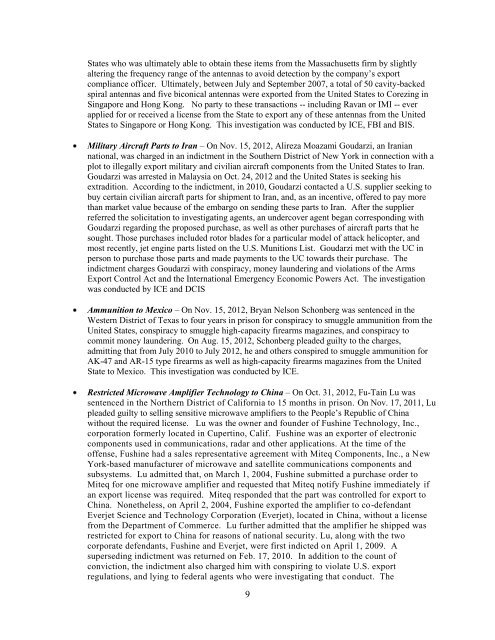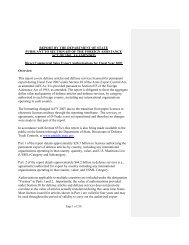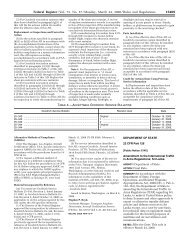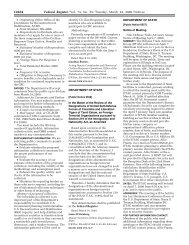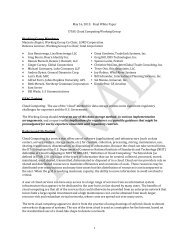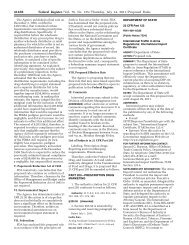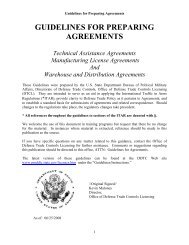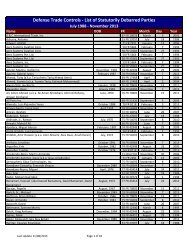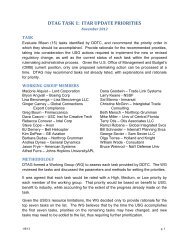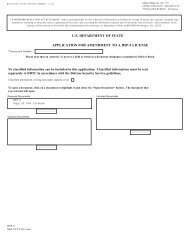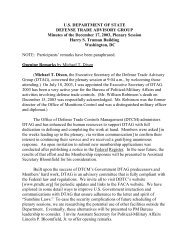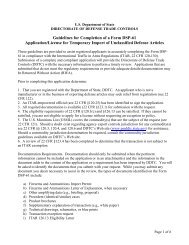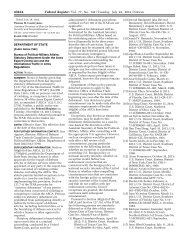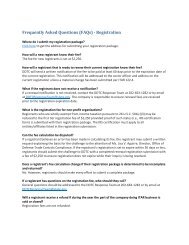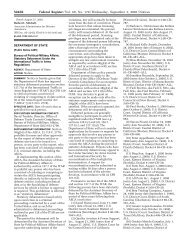Major Export Enforcement Cases - Directorate of Defense Trade ...
Major Export Enforcement Cases - Directorate of Defense Trade ...
Major Export Enforcement Cases - Directorate of Defense Trade ...
Create successful ePaper yourself
Turn your PDF publications into a flip-book with our unique Google optimized e-Paper software.
States who was ultimately able to obtain these items from the Massachusetts firm by slightly<br />
altering the frequency range <strong>of</strong> the antennas to avoid detection by the company’s export<br />
compliance <strong>of</strong>ficer. Ultimately, between July and September 2007, a total <strong>of</strong> 50 cavity-backed<br />
spiral antennas and five biconical antennas were exported from the United States to Corezing in<br />
Singapore and Hong Kong. No party to these transactions -- including Ravan or IMI -- ever<br />
applied for or received a license from the State to export any <strong>of</strong> these antennas from the United<br />
States to Singapore or Hong Kong. This investigation was conducted by ICE, FBI and BIS.<br />
Military Aircraft Parts to Iran – On Nov. 15, 2012, Alireza Moazami Goudarzi, an Iranian<br />
national, was charged in an indictment in the Southern District <strong>of</strong> New York in connection with a<br />
plot to illegally export military and civilian aircraft components from the United States to Iran.<br />
Goudarzi was arrested in Malaysia on Oct. 24, 2012 and the United States is seeking his<br />
extradition. According to the indictment, in 2010, Goudarzi contacted a U.S. supplier seeking to<br />
buy certain civilian aircraft parts for shipment to Iran, and, as an incentive, <strong>of</strong>fered to pay more<br />
than market value because <strong>of</strong> the embargo on sending these parts to Iran. After the supplier<br />
referred the solicitation to investigating agents, an undercover agent began corresponding with<br />
Goudarzi regarding the proposed purchase, as well as other purchases <strong>of</strong> aircraft parts that he<br />
sought. Those purchases included rotor blades for a particular model <strong>of</strong> attack helicopter, and<br />
most recently, jet engine parts listed on the U.S. Munitions List. Goudarzi met with the UC in<br />
person to purchase those parts and made payments to the UC towards their purchase. The<br />
indictment charges Goudarzi with conspiracy, money laundering and violations <strong>of</strong> the Arms<br />
<strong>Export</strong> Control Act and the International Emergency Economic Powers Act. The investigation<br />
was conducted by ICE and DCIS<br />
Ammunition to Mexico – On Nov. 15, 2012, Bryan Nelson Schonberg was sentenced in the<br />
Western District <strong>of</strong> Texas to four years in prison for conspiracy to smuggle ammunition from the<br />
United States, conspiracy to smuggle high-capacity firearms magazines, and conspiracy to<br />
commit money laundering. On Aug. 15, 2012, Schonberg pleaded guilty to the charges,<br />
admitting that from July 2010 to July 2012, he and others conspired to smuggle ammunition for<br />
AK-47 and AR-15 type firearms as well as high-capacity firearms magazines from the United<br />
State to Mexico. This investigation was conducted by ICE.<br />
Restricted Microwave Amplifier Technology to China – On Oct. 31, 2012, Fu-Tain Lu was<br />
sentenced in the Northern District <strong>of</strong> California to 15 months in prison. On Nov. 17, 2011, Lu<br />
pleaded guilty to selling sensitive microwave amplifiers to the People’s Republic <strong>of</strong> China<br />
without the required license. Lu was the owner and founder <strong>of</strong> Fushine Technology, Inc.,<br />
corporation formerly located in Cupertino, Calif. Fushine was an exporter <strong>of</strong> electronic<br />
components used in communications, radar and other applications. At the time <strong>of</strong> the<br />
<strong>of</strong>fense, Fushine had a sales representative agreement with Miteq Components, Inc., a New<br />
York-based manufacturer <strong>of</strong> microwave and satellite communications components and<br />
subsystems. Lu admitted that, on March 1, 2004, Fushine submitted a purchase order to<br />
Miteq for one microwave amplifier and requested that Miteq notify Fushine immediately if<br />
an export license was required. Miteq responded that the part was controlled for export to<br />
China. Nonetheless, on April 2, 2004, Fushine exported the amplifier to co-defendant<br />
Everjet Science and Technology Corporation (Everjet), located in China, without a license<br />
from the Department <strong>of</strong> Commerce. Lu further admitted that the amplifier he shipped was<br />
restricted for export to China for reasons <strong>of</strong> national security. Lu, along with the two<br />
corporate defendants, Fushine and Everjet, were first indicted on April 1, 2009. A<br />
superseding indictment was returned on Feb. 17, 2010. In addition to the count <strong>of</strong><br />
conviction, the indictment also charged him with conspiring to violate U.S. export<br />
regulations, and lying to federal agents who were investigating that conduct. The<br />
9


